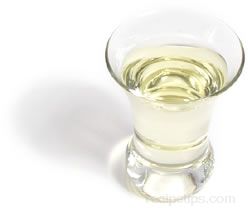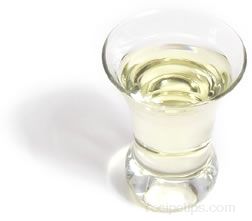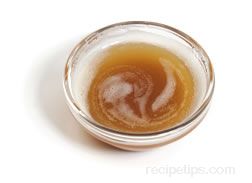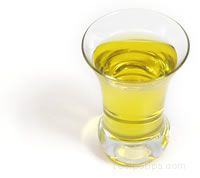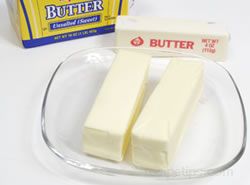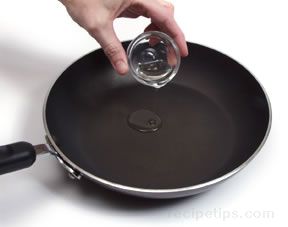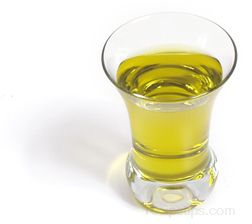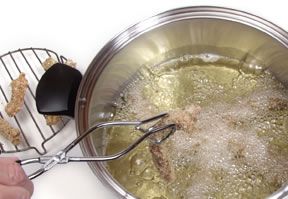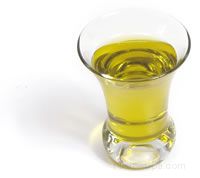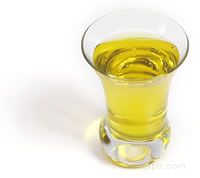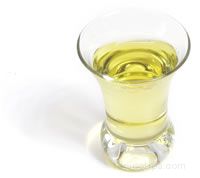Storage of Liquid Fats | Storage of Solid Fats
Deep-Frying Safety Tips | Olive Oil Handling/Safety/Storage
Guidelines for Storage of Liquid Fats
|
General Guidelines
|
|
Avocado Oil Avocado oil may be stored in the refrigerator for 9 to 12 months. |
|
Canola Oil Canola oil may be stored in a cool, dark cabinet away in its original container for 4 to 6 months or in the refrigerator for 9 months. |
|
Chile Oil If kept at room temperature, chile oil will last for at least 6 months, but the flavor and heat will gradually dissipate the longer it is kept. The intensity will deteriorate less rapidly if it is stored in the refrigerator. |
|
Corn Oil Since corn oil contains a high level of polyunsaturated fat, it should be stored in the refrigerator for up to 6 months. |
|
Grape Seed Oil Grape seed oil can be stored without refrigeration for 3 months if the storage temperature does not climb above 70ºF, however since it contains a high level of polyunsaturated fat, it is best to store it in the refrigerator for up to 6 months. Storing the oil in an area of excessive heat will cause it to deteriorate rapidly. |
|
Hazelnut Oil If hazelnut oil is stored in a cool dark cupboard, it will remain fresh for as long as 3 months, but it is best to store it in the refrigerator to prevent it from becoming rancid. If refrigeration causes the oil to solidify, it can be restored to a liquid state by leaving it at room temperature for an hour or two. |
|
Macadamia Nut Oil The high level of antioxidants slows rancidity and allows macadamia nut oil to be kept for up to two years without refrigeration and longer if it is refrigerated. |
|
Mustard Oil It is best to store mustard oil in the refrigerator where it will keep 5 to 6 months. It will keep for a considerably shorter period if it is stored in a cabinet. It should not be stored in a warm location. |
|
Olive Oil See Olive Oil Storage below. |
|
Palm Oil Due to the high level of saturated fat, palm oil resists rancidity and can be stored in its original container in a cool, dark cabinet for many months. |
|
Palm Kernel Oil Like palm oil, the high level of saturated fat in palm kernel oil (higher than palm oil) resists rancidity and therefore, it has a very long shelf life. Store in a cool, dark cabinet for one year or in the refrigerator. |
|
Peanut Oil Refined peanut oil will keep for long periods, usually 2 years and in many cases almost indefinitely if it is stored unopened in its original container in a cool, dark location. |
|
Safflower Oil Safflower oil has an extremely high level of polyunsaturated fat, which does not keep as well as other fat components and therefore it should be stored in the refrigerator where it will last for 6 months. |
|
Truffle Oil Because of its strength, only a few drops of truffle oil are required to add the earthy truffle flavor to a variety of foods, such as meat, fish, pasta, risotto, salads, and sauces. Truffle oil may lose some of its intense flavor and aroma if it is stored for long periods of time. |
|
Walnut Oil If improperly stored, walnut oil will become rancid quickly, especially if it is an unrefined version. If stored in a cool, dark cupboard, it will remain fresh for as long as 3 months, but like most unrefined oils and oils high in polyunsaturated fat, it is best to store it in the refrigerator to prevent it from becoming rancid. If refrigeration causes the oil to solidify, it can be restored to a liquid state by leaving it at room temperature for an hour or two prior to use. Refined walnut oil will keep for somewhat longer periods, but the refrigerator is still the best place to store it for optimum shelf life. |
Guidelines for Storage of Solid Fats
| Most solid fats are from animal sources, however there are exceptions. Tropical plant oils, such as coconut oil, are solid or semisolid at room temperature, and vegetable shortening and margarine made from plant oils are solid due to the hydrogenation process. Most solid fats also contain a higher degree of saturated fat than liquid fats and therefore are very stable and tend to keep for extended periods, especially when refrigerated. |
|
Brown Butter Brown butter can be stored in an airtight storage container and refrigerated for several weeks or it can be frozen for long-term storage. When reheating frozen brown butter, use caution when melting and heating it on the stove top so as not to burn the butter with a setting that is too high. The frozen butter can also be heated on a low microwave setting. |
|
Clarified Butter Although clarified butter keeps longer than whole butter due to the removal of the milk solids, homemade clarified butter should be refrigerated in case any milk solids are still remaining in the finished product. Refrigeration will allow clarified butter to remain useable for an extended period. |
|
Coconut Oil Coconut oil is solid or semisolid at room temperature due to its extremely high saturated fat content and therefore is resistant to rancidity. It can be kept in its container in a cool dark cabinet for many months and it can also be store in the refrigerator it will keep for an extended period. |
|
Ghee Ghee, which is usually sold in cans, does not have to be refrigerated because it contains no milk solids that can spoil. |
|
Lard Like butter, lard will absorb flavors and aromas so it should be tightly wrapped when it is stored. The label should be checked for the proper storage method because some types of lard, depending on the processing technique, may be stored at room temperature, while other types require refrigeration. |
|
Margarine Margarine should be stored in the refrigerator where it will keep for 2 months or more and for long term storage, it may be kept in the freezer for a half year or longer. Like butter and other solid fats, margarine will absorb the flavors and odors of other foods so it should be tightly wrapped or covered when storing. |
|
Sweet Butter Butter is perishable so it should be stored in the refrigerator. Although it is tempting to store it in a container in a cabinet at room temperature so that it is easy to spread, it will become rancid quickly due to the presence of milk solids that can spoil. When stored in the refrigerator, it should be tightly wrapped because it will absorb odors and flavors quite easily. Unsalted butter may be kept in the refrigerator for 2 or 3 weeks and salted butter may be kept somewhat longer (4 or 5 weeks) because the salt acts as a preservative. Butter freezes extremely well and may be kept in the freezer for at least a half year. |
|
Vegetable Shortening Vegetable shortening can be stored at room temperature for a year or more if it is tightly covered. The hydrogenation process makes it very stable and resistant to rancidity. |
|
The large quantity of hot oil used for deep-frying crates a major safety concern so the following points should be considered:
|
Olive Oil Handling, Safety, and Storage
|
Olive oil can be kept longer than most other edible oils. Although it can get rancid, olive oil is less likely to become rancid than other oils, especially if it is stored properly. The best containers for storage are glass (especially tinted glass), ceramic, porcelain, or non-reactive metals such as stainless steel. Olive oil will oxidize rapidly if it is not kept in a sealed container. If olive oil is stored in a bottle, always replace the cap on the bottle and keep it tightly sealed. Never put olive oil in a container that does not have a tight cap or some other method of sealing the container. Do not store olive oil in containers made of reactive metals such as copper or iron. The chemical reaction between the olive oil and the metal will damage the oil and may produce toxins. Olive oil should not be stored in plastic containers because the oil may absorb PVC's from the plastic. |
|
Temperature for Storage The ideal temperature for storing olive oil is 57°F, although a normal room temperature of 70ºF works very well if the olive oil is stored in a dark area where the temperature remains fairly constant. Olive oil will solidify at 36ºF, but it will return to a liquid state as soon as the temperature rises. In colder weather, olive oil may turn cloudy, especially if the temperature of the storage area falls below 50ºF. |
|
Locations for Storage It is important to store olive oil in a cool, dark place. A wine cellar is an ideal place for storing olive oil because it is dark and the temperature is cool and constant. Since most of us do not own wine cellars, a kitchen cabinet located away from the stove and away from direct sunlight will work quite well. Refrigeration will extend the life of olive oil without harming the oil. The oil will become cloudy and solidify in the refrigerator, but this will not significantly affect the quality or flavor. When the oil is warmed to room temperature it will return to a liquid state and its color will be restored. Refrigeration does not harm most grades of olive oil, but it is not recommended for expensive extra virgin varieties because condensation may develop in the bottle, affecting the flavor. |
|
Shelf Life Olive should keep a minimum of 15 months if it is properly stored. If it is stored in its original container and remains unopened, it should last for 2 years or more. Olive oil has the best flavor when it is used within a year after it is pressed and it is at its peak within 2 or 3 months after pressing. Unlike many types of wine, olive oil does not improve with age. As olive oil ages, it continually degrades and the acidity level rises. As a result, an older bottle of olive oil may have an unpleasant odor and taste. The oil will be neither harmful if consumed, nor very pleasing. Lower grades of olive oil usually have a shorter shelf life than top quality extra virgin oil because the acidity level is already higher at the time of bottling. A grade of olive such as semi-fine virgin, which has a much higher oleic acid content than extra virgin, may become less desirable after only a few months because the acidity level may rise to an unacceptable level. |
|
Safety Tips Olive oil is safe to use even if it has oxidized. The flavor and aroma may not be very pleasant, but it is not harmful if consumed. Some flavored olive oils have additives that may require refrigeration in order to preserve them. Others may not require refrigeration because of the process used when manufacturing the oil, so it is best to read the label carefully. It is usually not safe to make your own flavored olive oils at home and keep them for any length of time. Some flavoring agents may promote the growth of bacteria and can only be safely added with commercial processes. You may, however, prepare homemade flavored olive oils if they are used immediately and any leftover oil is disposed of. A major safety concern is when olive oil (and any other cooking oil) is heated to a very high temperature for deep-frying. Follow the recommendations listed under deep-frying safety tips for more on this. |

